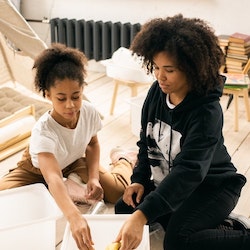There’s talk of repeating this school year. It’s a terrible idea.

I have no clue what my kids have learned this year. Based on the amount of time they spend “in school” and the small amount of homework they do, I can’t imagine they’ve covered everything they would have had they been on campus.
Will they be ready to move to the next grade level after (at least) a full year in distance learning? It’s not an easy question to answer.
Maybe it would be best to just start the year over again. The most equitable thing to do would be to have everyone redo their current grade. But that’s completely unnecessary. Despite all of the challenges, the year has not been a total zero.
There have been a lot of problems with distance learning. That’s clear. And it’s definitely been more difficult for the most vulnerable populations. But kids who have been attending Zoom school and doing most of what’s asked of them are not going to be a whole year behind. It’s simply not going to be necessary to reteach every standard. Rather, schools need to assess all students to see where the gaps are and then meet the standards in a highly differentiated program. As one kindergarten teacher told me, “next year is going to be academic triage.”
But academics shouldn’t be the main concern.
After a year or more away from school, kids are going to have a much harder time adjusting socially. A year is a long time for a child and kids are going to need a lot of practice just being students. The younger kids are going to have to re-learn how to get along with peers and sit in a classroom. I saw a post on Facebook that said “My kids are getting weird.” That about sums it up.
And think about middle and high school kids. There’s been no flirting or dating for a year, which are important developmental processes. Heck, even when students are back in class, they aren’t going to be able to see each other’s faces. We know how important peers are for adolescent development. There will certainly be some impact on their identity-formation.
So what about holding back some students, those who have been hit the hardest by the pandemic? I think we know who these students are. They are going to be predominantly low-income, English learners, and black and brown kids. What a disaster it would be to hold large portions of those populations back.
It’s been shown that holding students back makes students feel like failures. What is supposed to be fortifying often becomes defeating. There’s a stigma to being held back. And then add to the mix the child’s size in comparison to her peers and it’s hard to blend in. Think Nelson Muntz from the Simpsons.
Repeating a grade can be overwhelmingly deflating for a child. When they see their peers move on to the next grade, staying behind can be humiliating and cause students to be less engaged. It would be an absolute disaster to hold large portions of kids back, especially because of who those students would be.
There’s really only one answer to the question of holding kids back: What do the teacher and school think is the best way forward? That’s it. When my daughter told me she thought she needed glasses, I didn’t write her a prescription and order some Warby Parkers. I took her to the ophthalmologist. We need to let the professionals weigh in and do their jobs.
Let’s not blow up the whole thing. Let’s just be as patient as possible and move forward to the next grade. And let’s trust our teachers and schools to help all kids catch up.


